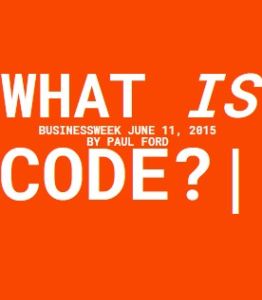Join getAbstract to access the summary!

Join getAbstract to access the summary!
Paul Ford
What Is Code?
Bloomberg Businessweek , 2015
What's inside?
Now you’ll be able to chat with your company’s Scrum Master around the water cooler without feeling out of your depth – almost.
Recommendation
If you’re not a professional programmer but you’ve ever used a computer, this article is for you – seriously. You will learn what code is, what software is, how apps get written, and what different programming languages do and why they matter. Plus you’ll get details about other technical issues. Along the way, Bloomberg Businessweek reporter Paul Ford explains the culture and some of the psychology of programming. This delightfully animated article is essential for anyone not in the programming field who uses computers. getAbstract recommends it to everyone interested in learning more about programming, its culture and its principles.
Summary
About the Author
Paul Ford is a programmer and a founding partner of Postlight.
















Comment on this summary